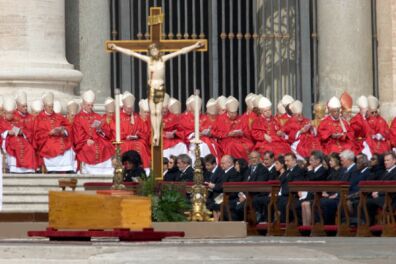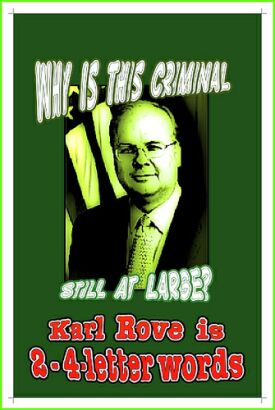Marketplace Morality
From The New CriterionA generation ago, before John Paul II was pope, even those who were in favor of ecclesiastical innovation might have been shocked at the idea of applause in church. Yet when the Papal Nuncio to Washington gave the homily at the Pope’s funeral mass in St Matthew’s Cathedral there, the congregation responded with the theatre’s traditional gesture of appreciation. My impression is that the new custom of applause in church arose in America in the later years of John Paul’s pontificate, but they were applauding in St Peter’s Square in Rome too, which suggests that it has now spread around the world. Probably, it is too late to rein in the enthusiasm of communicants for clapping in appreciation of their pastors’ efforts, yet it may just be worth pointing out that there was a reason why applause once seemed out of place in church and it was not just because of tradition, stuffiness or a hidebound unwillingness to change.
The silence of the faithful was, rather, a constant reminder that the values of the theatre and those of the church are and ought to be distinct. The theatre belongs to the world of commerce, where the customer is, as is well known, always right. The whole point of a theatrical performance is, or used to be, to please the audience, and the audience customarily signifies that it has, indeed, been pleased by clapping its hands. Those who have got their money’s worth of entertainment perhaps feel the need to demonstrate their open-handedness to the players, who customarily acknowledge their appreciation by smiling and bowing. But Christian worship is not a commercial enterprise, and the point of it is not to please the congregation. Indeed, it is often to chastise and correct it. If popularity were the church’s concern, the highlight of the Christian year would be not Good Friday or Easter, but Palm Sunday. The attitude of the church to the applause of its members should be like that of the Army drill instructor who rebuked his men for cheering him. Let them get away with that and the next thing you know they’ll think they have the right to criticize him too.
But the traditional values of the church and those of the theatre have now changed places. Nowadays drama, like the other arts, is supposed to be good for you, and people submit themselves to being insulted and criticized and preached at in the theatre as they never would in church. Schoolchildren are examined on their knowledge of secular drama and literature, but it is thought scandalous that they should be given any moral instruction. All that kind of thing, if they or their parents should happen to have a taste for it, should be left to their free time, we think. Meanwhile, all across the land clergymen may be found who boast of their ability to entice people into their churches with music or poetry or dance — or tacit assurances that they won’t be challenged as to their moral or sexual behavior. Critics of the late pontiff, to whom we shall return, almost invariably mentioned declining church membership, as if religious leaders were a species of carnival barkers, charged above all with enticing people into the church with promises of entertainment and excitement.
What else could they be, after all, if you start from the assumption that the church’s interest in personal morality is “rigid” and “doctrinaire” and that individuals must be treated as having the right to make up their own minds about what is right and wrong “for them”? At a stroke, the teaching function of the church is obviated by such views, which are probably held now even by the majority of church-goers. The only people whose moral behavior regularly comes in for criticism in the mainstream churches of America today are the country’s political leaders and some of their ideological brethren, particularly those who seem to liberal-minded clergymen to cling to the “rigid” and “doctrinaire” views of the past. On Easter Sunday, the Presbyterian pastor of a church in a socially up-market neighborhood near me was heard to offer up a prayer to whatever god that church still acknowledges that the “pro-life activists” seeking to preserve the life of Terri Schiavo would give up their activities and allow “the family” its sacred right to grieve in private.
I find that I can scarcely bring myself to write about poor Mrs Schiavo, who died four days later — after the legal recourses of those same “pro-life activists” had been exhausted. If it is indeed true, as the media frequently informed us it was, that large majorities of Americans supported the right of this woman’s estranged husband to starve her to death for no more reason than that he, a self-interested party, averred that knowledge and understanding of her condition would have made her wish to be starved — implausible on the face of it, even if he had been a reliable witness — and that she was prevented by her illness from suggesting otherwise, then I am stunned into silence. Numerous intelligent people whose opinions I normally respect were prepared to apologize for what seemed to me patently an act of barbarism on the pricelessly sophistical grounds that it was, of all things, a victory for “the rule of law.” There are times, gentlemen, when decency requires that we echo Dickens’s Mr Bumble and say that “If the law supposes that, then the law is a ass — a idiot.”
But then that’s just me, isn’t it? Decency is a communal and consensual standard which changes over time and with which I am pretty clearly out of step. Mr Bumble was complaining about the law’s now long-abandoned assumption that he was in control of his wife’s actions, and its assumption in the Schiavo case that her husband was entitled to speak for her merely by virtue of being married to her seemed like a throwback to those days. Yet both legal principles must be supposed to embody, like the common law of which they are a part, a certain folk wisdom of their time. Though a carefully worded poll by Zogby for the Christian Defense Coalition taken at the time Terri Schiavo died suggested more conflicted feelings on the part of the public than appeared from the earlier ABC and Gallup polls, I think it is probably still true to say that what we call common decency is now on the side of death. Unlike morality, which is derived from philosophical first principles, decency is a matter of custom and general acceptance, and its standards are obviously changing to meet the new realities of an age in which being “pro-life” means holding “extreme” and “right-wing” political views offensive to the majority, perhaps even of one’s fellow-Christians.
That the late pontiff was among those who held such views was naturally a source of some embarrassment to the media when he died two days after Mrs Schiavo. The world-wide outpouring of grief was like nothing they had seen since the death of Princess Diana — who, by contrast, had been a young woman in the prime of her life. Now here was an old man who had clearly come to the end of his days, and yet no one seemed to doubt for a moment that he was entitled to the full Diana treatment. As Diane Sawyer put it, “From the moment he emerged on the balcony” on being proclaimed pope, Jean Paul II “was recognized as a kind of rock star of Popes.” Likewise, Peter Jennings saw His Holiness as “an icon of celebrity” and “a rock star as well as a religious leader.” Or, as Jesus might have put it, Thou art Peter (“the rambunctious apostle,” according to Phil McCombs in The Washington Post), and upon this Rock Star will I build my church.
But then Jesus himself was and remains a rock star too, at least if we are to believe the very hip commentators on Fox News on Easter Sunday morning: “Jesus Christ has been a superstar for centuries,” one of them teased their special Easter report: “but is Jesus cool now?” It’s actually quite a good question, and the answer appears to be that Jesus is cool when the media need him to be cool — say, while they are commenting on the pomp and pageantry of a papal funeral — and not cool when it comes to the liberal principles, particularly those related to human sexuality, that they care about as much as or even more than they do the icons of celebrity to which they offer up such assiduous devotion. To look at their treatment of most celebrities, you wouldn’t think they care about anything else, but the pope was the exception who proved the rule, apparently, since his celebrity was almost invariably linked to or qualified by his inexplicably retrograde views on abortion, divorce, homosexuality, clerical celibacy and women priests.
There was, perhaps, a time — and not so very long ago either — when even the most bumptious of journalists would have had enough of a sense of decorum and intellectual humility to have seen the absurdity in patronizing the Pope on moral issues in the way that Mr Damon Linker did in The New Republic:
After a century of mass murder, John Paul’s unconditional defense of human dignity cannot fail to impress. His articulate and passionate advocacy for human rights helped to bring about the fall of communism, and it justly earned him the respect and admiration of humanists (Christian and non-Christian alike) around the globe. Yet there are reasons to be suspicious of all absolutisms — even the noblest kinds. While they inspire great certainty and conviction, they also distort our vision, obscuring the exceedingly complicated, even paradoxical, character of morality itself. . .
And so he goes on to the usual strictures about the pro-life approach to stem-cell research and Terri Schiavo. Silly old Pope, eh? Of course! Why didn’t he think to be suspicious of absolutisms? He must feel quite a chump, as he looks down from heaven, for not having understood something so obvious to the likes of D. Linker — who, we are told, “is writing a book about the influence of religious conservatism on American politics.” Hmm. I wonder what sort of conclusions we may expect him to come to about such influence?
The television commentators were much worse. Here is how Christiane Amanpour of CNN — speaking with what may have been the largest crowd ever to gather in one place in human history behind her shouting Santo! Santo! — saw the “the real question” raised by the pope’s demise: “The real question, of course, is how the Church will keep itself relevant in the centuries to come, or even in the next generation.” Relevant? One hates to say it, but the blindingly obvious contrast between those crowds and CNN’s generally anaemic ratings suggests that the church needs no advice from CNN on what is relevant and what isn’t. Probably more people were in St Peter’s Square that day than were watching around the world as Miss Amanpour opined as to the church’s “relevance.” But of course “relevant” and “relevance” are media code words for the right views on moral subjects that are important to the media. This was clear from Miss Amanpour’s commentary as she maundered on to fill the broadcast time, always praising the pope and always qualifying her praise in the same way:
. . .no matter the fact that in many parts of the world, particularly the developed world, the church, the congregation was beginning to dwindle, somehow people’s personal connection and people’s personal admiration for him transcended, perhaps, some of their unease with the more doctrinaire, orthodox theology that he prescribed for Catholics around the world and that many Catholics felt that they simply could not practice in today’s modern world and caused many Catholics to follow their own conscience instead of his. . . So he has been very much devoted, and as I say, people have grown up with him as their symbol of morality, even though many people in the Catholic church don’t particularly adhere or practice his very doctrinaire, very orthodox version of Catholicism. . . There are many reasons why many Catholics feel that they cannot strictly follow the doctrinal teachings of this particular pope and yet people, many of them, want to love their faith. . .So, people do admire him and people say that, you know, there weren’t that many moral leaders and there aren’t that many moral leaders in this world. And, again, you know, many people have been hurt terribly by the pedophilia scandals in the Catholic Church, by the notion that the pope will not allow the use of condoms, for instance, even to stop the spread of deadly diseases, such as AIDS, by the notion that women are disenfranchised from the highest honors of the Catholic Church being ordained. . . A pope who embraced AIDS victims and who went to Africa and talked to them, and there are pictures of him being embraced by young AIDS victims, and yet who refused to sanction the use of condoms to stop the spread of AIDS. . .
This seemed a slightly more diplomatic way of saying what Polly Toynbee wrote in The Guardian: “With its ban on condoms, the Church has caused the death of millions of Catholics and others in areas dominated by Catholic missionaries in Africa and right across the globe.”
In such bêtises there seems to me to be a spectacular failure of moral imagination which passes unnoticed because it is all but universal in the media. Perhaps they teach it in journalism school, or perhaps J-school selects for those who already have it, but it is becoming more and more difficult to find anyone charged with commenting on public and political events who is capable of understanding that moral objections to recreational, guilt-free sex are even conceivable, let alone conceivably valid. To the people who are afflicted with this sort of blindness, it can only be an inexplicable perversity on the part of this otherwise admirable and courageous man that he should have denied recreational sex the means to make itself “safe” and without consequence for those who, presumably, already accept the church’s teachings on sexual morality. Or do they suppose that those whose death the Church has, according to Miss Toynbee, “caused” were prepared completely to disregard the Holy Father’s teachings as to whom they might have sexual relations with and under what circumstances and yet to respect his teachings with the utmost punctiliousness, and to their own destruction, with respect to questions of the permissible methods of contraception?
I suspect that not even Polly Toynbee is really that stupid. Her laying of responsibility for AIDS deaths at the Vatican’s magnificent doorstep was just a typically hyperbolical way of expressing her anger and resentment that, in the brave new moral world that has emerged in the West since the 1960s, there should be anyone left who is allowed to hold those old-fashioned “extreme” and “pro-life” views which the late pope championed. The days are long gone when the Catholic church was able to compel belief, or to enforce its moral strictures upon unwilling communities. Those who believe as the pope believed hold their views voluntarily and upon serious reflection, and their powers of coercion upon others, as the Terri Schiavo case showed, are all but non-existent. Yet, as in that case, there seemed a kind of rage on the part of the journalistic left that anyone should believe as they do at all, an assumption that being pro-life is tantamount to an endorsement of what Frank Rich, the American Polly Toynbee, calls “the apocalyptic right’s growing theocratic crusade.”
Perhaps the media’s long-standing arrogation to itself of the right to make pontifical judgments on matters of life and death has made such delusions inevitable. It has certainly disabled them from recognizing a real pontiff even when he is being mourned by millions under their very noses. How curious it seemed to them that this celebrity pope (“despite enjoying almost rock star status,” said Miss Amanpour’s CNN colleague, Paula Zahn, “Pope John Paul’s message on certain issues put him at odds with many of the faithful in this country”) should have failed to follow the teachings on sexual morality of the media and his fellow celebrities. Even when it came to governing the Church, the pope’s “rigid” and “doctrinaire” approach left him without the wit to follow the advice of Tom Shales of the Washington Post who noted approvingly of the TV coverage of his funeral that “the networks maintained their journalistic responsibility by including the fact that no man and no pope is perfect, and that John Paul II had been criticized in his time for failing to promote a properly ‘collegial’ atmosphere among the cardinals and other church leaders, that he thus received ‘low marks’ for ‘power sharing.’”
Perhaps Tom Shales imagines that popes live, or ought to live, as much in fear of “low marks” from Tom Shales as network executives do. It would not be surprising if he did — and for the same reason that “journalistic responsibility” requires second-guessing the pope on questions of morality and church government or that it seems natural for journalists to be unable to tell the difference between a widely-venerated religious leader and a rock star. It is on account of the social equivalent of Gresham’s law, namely, that bad culture drives out good. For a while, that is, it may have been possible for the celebrity culture of the media to co-exist with the honor culture which it has superseded. But that time must pass, and eventually it will come to seem to nearly everyone that there is no honor but celebrity, no morality but that of the marketplace and no religion but that of show-business. That, at any rate, appears to be the state of affairs at which we have now arrived.
Discover more from James Bowman
Subscribe to get the latest posts to your email.







